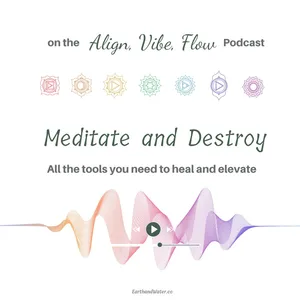Podcast Summary
Understanding the Power of the Subconscious Mind and Patterns: Recognize the influence of the subconscious mind and patterns on our behavior and experiences, and use a 4-step repatterning technique to shift these patterns for a more fulfilling life.
Our subconscious mind, which operates below the level of consciousness, plays a significant role in shaping our lived experience. It sets our physiological state and is responsible for 80% of our behavior and interactions with the world. Our subconscious mind is influenced by patterns, which can be changed to bring about positive transformation. These patterns are shaped by our past experiences and are influenced by the right-left brain hemisphere paradigms that dominate our society. By understanding how our brain processes information and recognizing the role of patterns in our lives, we can make conscious choices to shift these patterns and create a more fulfilling life. Adele Sprague, an award-winning author and thought leader, has developed a 4-step repatterning technique to help individuals achieve extraordinary levels of happiness, peace of mind, prosperity, and goal achievement by addressing patterns at their root cause.
Our Brain Creates Patterns for Survival: Understanding patterns formed by past experiences shapes our actions and perceptions, but updating them is crucial for progress.
Our brain creates patterns for survival, and these patterns shape our actions and perceptions. These patterns are formed based on past experiences, and by the time we reach adulthood, our brain relies heavily on these patterns to navigate new situations. However, the world keeps changing, and we need to update our patterns to progress. The unconscious mind starts firing off questions before we consciously think of them, challenging our understanding of free will. Patterns serve to turn the unknown into something known in the least amount of time with the least amount of data, but they don't have a moral compass or logic. To improve our situations, we need to focus on upgrading our patterns rather than solely addressing the situation itself.
Relying solely on commitment and willpower can lead to failure: Understanding and addressing underlying patterns is key to achieving goals, rather than relying solely on commitment and willpower.
Relying solely on commitment and willpower to achieve goals can lead to conflict, struggle, and ultimately failure. The speaker, who was once a coach in a popular self-help industry that emphasized the importance of commitment, discovered this firsthand. Despite her deep commitment to her business ideas, she kept hitting a wall due to an ingrained pattern that prevented her from taking action. This pattern led to feelings of panic, fear, and shame, causing her to quit and start over. She realized that changing her pattern was key to achieving her goals, rather than relying on willpower and commitment alone. The self-help industry's emphasis on pushing past comfort zones and thinking positively can sometimes trigger a deprivation cycle and lead to self-sabotaging behaviors. Instead, it's essential to understand that there are different ways to approach problems and that blame and shame are not productive. By recognizing and addressing the underlying patterns that prevent us from taking action, we can achieve our goals more effectively.
Left-brain dominant society limits creativity and emotional expression: Recognize the importance of both brain hemispheres for balanced personal and professional growth, as a left-brain dominant approach overlooks the role of the right brain in creativity, emotional expression, and present awareness.
Our society and personal development have been influenced by a left-brain dominant approach, which focuses on blame and shame, and overlooks the importance of the right brain's role in creativity, emotional expression, and present awareness. This imbalance, as described in Ian McGillchrist's book "The Master and His Emissary," has been exacerbated over generations through overeducation of the left brain and thickening of the corpus callosum. The right brain, which is responsible for artistic and creative functions, as well as emotional expression and present awareness, has been sidelined. This imbalance limits our ability to effectively navigate complex situations and respond appropriately, as the right brain brings context and can detect subtle cues that the left brain may miss. The societal system may not be intentionally keeping us in this loop, but it is essential to recognize the importance of both hemispheres and strive for a more balanced approach to personal and professional growth.
Understanding Brain Hemispheres and Their Impact: Recognize left hemisphere patterns, question their benefits, and use techniques to foster whole brain thinking for a more balanced and effective life.
Our individual patterns and societal norms have shaped us into a left-brain dominated world of blame and shame. However, instead of focusing on blame, we should question if this way of living is beneficial for everyone. To achieve whole brain thinking or "enlightened thinking," we need to understand the philosophy behind hemisphere functioning and use techniques to rebuild communication between them. Awareness of patterns and their impact on ourselves and others is crucial. The left hemisphere sees the world as a resource and can lead to a feeling of being stuck on a hamster wheel. By recognizing this and focusing on feel, act, think, we can break free from this cycle and create a more balanced and effective way of living.
Understanding the Impact of Left and Right Brain Hemispheres: Both left and right brain hemispheres have their importance, but an imbalance towards the left hemisphere can lead to a reductionist view, while the right hemisphere fosters a holistic perspective. Aim for balance to foster positive relationships and change.
The way we perceive the world and the way we lead can be influenced by the balance between our left and right hemispheres of the brain. The left hemisphere, which is logical and analytical, can lead to a reductionist view of people and resources, seeing them as things to be used up rather than relationships to be nurtured. This can result in a monstrous way of operating, devoid of context and empathy. On the other hand, the right hemisphere, which is creative and intuitive, can help us see the world in a more holistic and relational way, asking questions about context and relationships. It's important to recognize that both hemispheres have their place, but when the left hemisphere is cut off from its right side counterpart, it can become a problem. In our personal lives and in the world at large, we need to strive for a balance between the two hemispheres, recognizing that we are energy beings connected to all other energy beings around us, rather than just things progressing through time and space. By rebuilding this balance within ourselves, we can create a ripple effect that can lead to positive change.
Accessing Past Experiences through Feelings: Shift from 'think, act, feel' to 'feel, act, think' for new insights, letting go of grudges, and stepping into a new way of being.
Our experiences, both past and present, are stored in the unconscious regions of our brain, and accessing this vast warehouse of knowledge requires us to tap into our right hemisphere, which deals with feelings and sensations. Our patterns of thinking, feeling, and acting are interconnected, and our brain constantly creates narratives to explain our experiences. The speaker encourages us to shift from "think, act, feel" to "feel, act, think," allowing us to react to situations in the present moment before our minds create stories about them. This approach can lead to new insights, letting go of grudges, and stepping into a new way of being. The triangle of wisdom, compassion, and trust is a holistic perspective given by the whole brain, while the left brain focuses on right and wrong.
Childhood traumas shape our patterns of behavior: Identifying and repatterning deeply ingrained patterns from childhood can lead to personal growth and positive impact on relationships and the world
Our past experiences, including childhood traumas, shape our patterns of behavior and survival. These patterns can be deeply ingrained and essential for protection, but when the world moves on, it's important to upgrade and integrate them to prevent getting back into harmful situations and to be more compassionate towards others. Identifying and repatterning these subconscious patterns can lead to personal growth and a positive impact on relationships and the world around us. It's essential to prioritize self-care and focus on personal development, even if it seems selfish, as the ripple effects can be tremendous and lead to positive changes for everyone involved.
Identifying and shifting limiting patterns for personal growth: Recognize limiting patterns, understand they're not a reflection of worth, use 4-step repatterning technique to shift, find support in community
Personal growth involves recognizing and upgrading limiting patterns in various aspects of life. These patterns, which can be related to relationships, finances, communication, leadership, or creativity, among others, can significantly impact our daily experiences. Understanding that these patterns are not a reflection of personal worth but rather a result of the brain's wiring can lead to self-compassion and forgiveness. The 4-step repatterning technique, a tool provided by the Patternmaker Hub, can help individuals identify and shift these patterns, leading to a more fulfilling and authentic life. The community aspect of the Patternmaker Hub offers a supportive environment where individuals can share their experiences and learn from one another without judgment.
The influence of communities on our brains: Joining positive communities shapes our thoughts and behaviors, while recognizing negative patterns as someone else's helps protect us from their influence. Trusting ourselves and seeking out communities that align with our needs and values is essential for personal growth.
Our brain is heavily influenced by the communities and groups we join, as we are influenced by them just as much as we influence them. The patterns and values of these groups have an impact on our brains, shaping our thoughts and behaviors. Therefore, it's essential to join the right communities where we can positively influence each other and protect ourselves from negative patterns by recognizing them as someone else's, rather than taking them personally. Remember, what others think of us is not our responsibility, as they are interacting with the patterns they have created for us, not the true us. Additionally, it's important to assess whether the group patterns align with our individual needs and values, and if not, seek out new communities where we can thrive. Trusting ourselves and acknowledging our reactions is crucial in navigating these groups and ensuring our personal growth.
Navigating a Changing World with Compassion and Curiosity: Embrace the shift towards a more balanced brain function, challenge traditional ways of thinking, and ask if patterns and systems work for everyone.
We are living in a time of great change and evolution, both individually and collectively. Our brains are shifting from a left hemisphere dominance to a more balanced approach that values context and individuality. This shift is evident in various aspects of society, such as gender fluidity and the Me Too movement, which challenge traditional left hemisphere ways of thinking. The key is to move beyond right or wrong thinking and ask if these patterns and systems are working for everyone. Many people are struggling to adapt to this new fluidity, especially in the gender narrative, but it's essential to remember that they are not wrong, just stuck in outdated patterns. By recognizing and owning our patterns, we can transform and grow together. The most important question for today is, "Does it work?" Let's tap into our right hemisphere and navigate this changing world with compassion and curiosity.
Exploring the power of patterns in shaping our experiences: Patterns of thinking, feeling, and acting shape our experiences and limit our potential, but traditional methods to change them are not effective. Intentional repatterning involves feeling, acting, and then thinking for personal empowerment.
Our patterns of thinking, feeling, and acting are deeply ingrained below the level of conscious awareness, and they shape our experiences and limit our potential. Adele Sprague, the guest on the podcast, emphasizes that these patterns are not under our control, and traditional methods like commitment, willpower, and discipline are not effective in changing them. Instead, she advocates for intentional repatterning, which involves feeling, acting, and then thinking. In her book "Shift: 4 Steps of Personal Empowerment," she explores the importance of patterns for survival, their inherent limitations, and the different types of patterns. She also discusses the sequence of patterning and the role of awareness, surrender, and intention in creating change. To learn more, check out Adele's website at adelsprague.com, where you can get a free copy of her book and access her training on left brain, right brain, and the pattern maker hub. Join the community and be a part of the supportive and empowering environment she has created.
The Power of Connection and Community: Engage with Illuminated Podcast, subscribe, leave a review, share, and connect with Jennifer for personal growth and learning opportunities, plus receive a discount for private coaching sessions.
Key takeaway from this conversation with Jennifer is the importance of connection and community in personal growth and learning. Jennifer emphasizes the value of subscribing, leaving a review, and sharing the podcast to continue the act of co-creation. As a token of appreciation, she offers a discount for those who mention the podcast when booking a private coaching session with her. With a background in Pilates, yoga, and studies at the Czech Institute, Jennifer is dedicated to continuous learning and sharing her knowledge with others. By engaging with her and her guests, listeners can tap into a wealth of wisdom and join a supportive community. So, hit subscribe, leave a review, and connect with Jennifer on social media to be a part of Illuminated's growing community.





